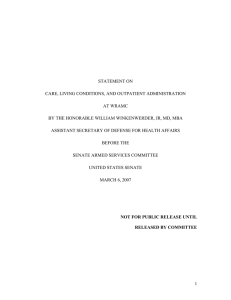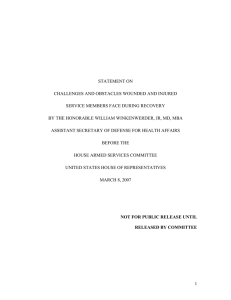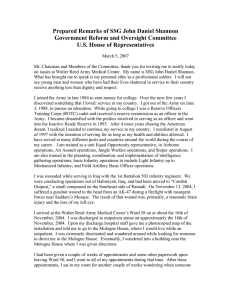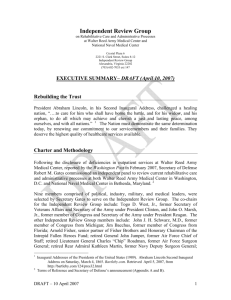ONE HUNDRED TENTH CONGRESS
advertisement
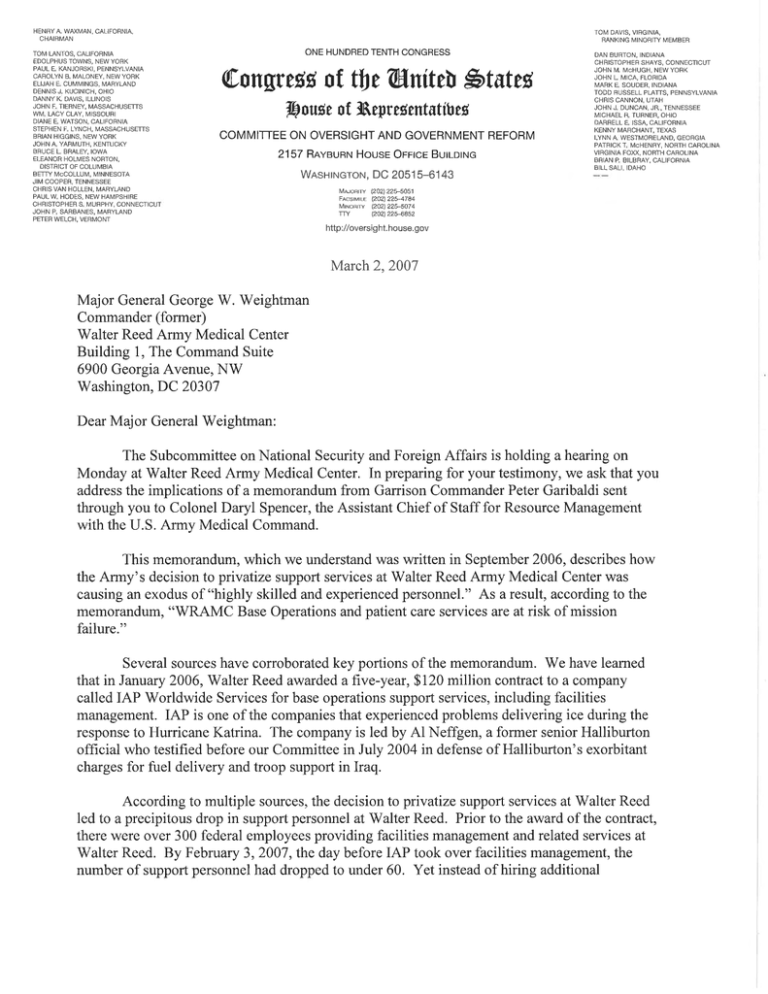
HENRY A. WAXMAN, CALIFORNIA, CHAIRMAN TOM LAWOS. CALIFORNIA EDOLPHUSTOWNS, NEW YORK PAUL E. KANJORSKI, PENNSYLVANIA CAROLYN B. MALONEY, NEW YORK ELIJAH E. CUMMINGS, MARYLAND DENNIS J. KUCINICH. OHIO DANNY K. DAVIS. ILLINOIS JOHN F. TIERN&. M A S S A C H U S ~ S WM. LACY CLAY, MISSOURI DIANE E. WATSON, CALIFORNIA STEPHEN F. LYNCH. MASSACHUSmS BRIAN HIGGINS, NEW YORK JOHN A. YARMUTH. KENTUCKY BRUCE L. BRALEY, IOWA ELEANOR HOLMES NORTON. DISTRICTOF COLUMBIA B E W f McCOLLUM. MINNESOTA JIM COOPER, TENNESSEE CHRIS VAN HOLLEN. MARYLAND PAUL W. HODES, NEW HAMPSHIRE CHRISTOPHER S. MURPHY, CONNECTICUT JOHN P. SARBANES. MARYLAND PETER WELCH. VERMONT TOM DAVIS. VIRGINIA, RANKING MINORITY MEMBER ONE HUNDRED TENTH CONGRESS COMMllTEE ON OVERSIGHT AND GOVERNMENT REFORM DAN BURTON. INDIANA CHRISTOPHER SHAYS, CONNECTICUT JOHN M. McHUGH, NEW YORK JOHN L. MICA. FLORIDA MARK E. SOUDER, INDIANA TODD RUSSELL PLAnS. PENNSYLVANIA CHRIS CANNON, UTAH JOHN J. DUNCAN, JR., TENNESSEE MICHAEL A. TURNER. OHIO DARRELL E. ISSA. CALIFORNIA KENNY MARCHANT. TEXAS LYNN A. WESTMORELAND. GEORGIA PATRICK T. McHENRY, NORTH CAROLINA VIRGINIA FOX,' N O R M CAROLINA BRIAN P. BILBRAY. CALIFORNIA BILL SALI, IDAHO -- March 2,2007 Major General George W. Weightman Commander (former) Walter Reed Army Medical Center Building 1, The Command Suite 6900 Georgia Avenue, NW Washington, DC 20307 Dear Major General Weightman: The Subcommittee on National Security and Foreign Affairs is holding a hearing on Monday at Walter Reed Army Medical Center. In preparing for your testimony, we ask that you address the implications of a memorandum from Garrison Commander Peter Garibaldi sent through you to Colonel Daryl Spencer, the Assistant Chief of Staff for Resource Management with the U.S. Army Medical Command. This memorandum, which we understand was written in September 2006, describes how the Army's decision to privatize support services at Walter Reed Army Medical Center was causing an exodus of "highly skilled and experienced personnel." As a result, according to the memorandum, "WRAMC Base Operations and patient care services are at risk of mission failure." Several sources have corroborated key portions of the memorandum. We have learned that in January 2006, Walter Reed awarded a five-year, $120 million contract to a company called IAP Worldwide Services for base operations support services, including facilities management. IAP is one of the companies that experienced problems delivering ice during the response to Hurricane Katrina. The company is led by A1 Neffgen, a former senior Halliburton official who testified before our Committee in July 2004 in defense of Halliburton's exorbitant charges for fuel delivery and troop support in Iraq. According to multiple sources, the decision to privatize support services at Walter Reed led to a precipitous drop in support personnel at Walter Reed. Prior to the award of the contract, there were over 300 federal employees providing facilities management and related services at Walter Reed. By February 3,2007, the day before IAP took over facilities management, the number of support personnel had dropped to under 60. Yet instead of hiring additional Maj. Gen. George W. Weightman March 2,2007 Page 2 personnel, IAP apparently replaced the remaining 60 federal employees with only 50 IAP personnel. The conditions that have been described at Walter Reed are disgraceful. Part of our mission on the Oversight Committee is to investigate what led to the breakdown in services. It would be reprehensible if the deplorable conditions were caused or aggravated by an ideological commitment to privatize government services regardless of the costs to taxpayers and the consequences for wounded soldiers. Privatization of Support Services at Walter Reed It appears that over the past six years, the Defense Department has been engaged in a systematic effort to replace federal workers at Walter Reed with private companies for a host of functions, including facilities management, patient care, and even guard post duty entrance. This effort occurred under the A-76 process, which is shorthand for OMB Circular A-76. he A-76 process was an element of Vice President Gore's reinventing government initiative. The idea behind A-76 is to force federal employees to compete with the private sector for the jobs being performed by the federal employees. The process of considering Walter Reed for A-76 competitions began in 2000. But the push to privatize support services there accelerated under President Bush's "competitive sourcing" initiative, which was launched in 2002. According to OMB, the goal of President Bush's competitive sourcing initiative was to allow the private sector to compete for nearly half of all federal jobs.' In September 2004, the Army determined that the in-house federal workforce at Walter Reed could perform support services at Walter Reed at a lower cost than the bid received from IAP Worldwide Services. IAP protested this determination. As a result of the protest, the Army Audit Agency was directed to reevaluate the bid from the federal employees. It has been reported that the Army Audit Agency withdrew its certification of the employee bid and unilaterally raised the bid by $7 million, thereby making the employee bid higher than the contractor bid.2 The Army then reversed its determination and resolved the A-76 process in favor of IAP. 1 Office of the President of the United States, The President's Management Agenda (accessed Fiscal Year 2002 (online at www.whitehouse.gov/omb/budget/fy2002/mgmt.pd March 2,2007). GAO Declines to Hear Protest of Walter Reed Competitive Sourcing Decision, GovExec.com (Feb. 24, 2006) (online at www.govexec.com/dailyfed/0306/032306ml .htm). Maj. Gen. George W. Weightman March 2,2007 Page 3 When the employees sought to appeal this ruling, they were not allowed to make their case. Alan King, the Deputy Garrison Commander at Walter Reed, filed a protest of the contract award with GAO, but under the A-76 rules in place at the time, federal employees had no standing to object to A-76 determinations. Consequently, there was no similar cost review of the IAP bid proposal. The company that sought to take over support services at Walter Reed, IAP Worldwide Services, is led by A1 Neffgen, the CEO. Mr. Neffgen was previously Chief Operating Officer of Government and Infrastructure for the Americas Region at KBR, a subsidiary of Halliburton. Mr. Neffgren testified for KBR before our Committee on July 22,2004, regarding overcharges for fuel imported into Iraq and excessive billings for troop support services, such as laundry, housing, and food service^.^ IAP itself was the subject of congressional examination for problems it encountered in the delivery of ice to the Gulf Coast Region following Hurricane ~ a t r i n a IAP . ~ acquired Johnson Controls, the original private sector bidder, in March 2005.~ Attrition of Skilled Workers In January 2006, when all the bid protests had been resolved in IAP's favor, the Anny announced that it would award a five-year contract for base operations support services at Walter Reed to IAP. The contract is valued at over $120 million. The contract is reportedly structured as a "cost-plus" contract, meaning that IAP gets reimbursed for its costs and then receives an additional award fee as profit.6 Although the contract was awarded in January 2006, IAP did not begin working at Walter Reed until over a year later, on February 4,2007. During the one-year period between the award of the contract and IAP beginning work, skilled government workers apparently began leaving Walter Reed in droves. These employees included skilled maintenance personnel and workers with specific knowledge of Walter Reed's systems and infrastructure. House Committee on Government Reform, Hearings on Contracting and the Rebuilding of Iraq (July 22,2004). Payments on Katrina Contract Halted After Billing Questions, Washington Post (Nov. 17, 2005) (online at www.washingtonpost.com/wp-dyn/content/ article/2005/ 111161AR2005111602264.html). Company News: Johnson Controls to Sell Unit to IAP Worldwide, New York Times (Feb. 12, 2005) (online at http://query .nytimes.com/gst/fullpage.html?res= 9AODE6D9143AF931A2575 1COA9639CSB63). $25.8M Over 5 Yearsfor Base Ops Support at Walter Reed, Defense Industry Daily (Nov. 14,2006) (www.defenseindustrydaily.com/2006/11/258m-over-5-years-for-base-opssupport-at-walter-reed/index.php). Maj. Gen. George W. Weightman March 2,2007 Page 4 Information obtained by the Committee suggests that during the year between the contract award and IAP's start of performance, government employee staff levels dropped from a high of over 300 last year to under 60 on February 3,2007, the last day federal employees performed these services. When IAP took over on February 4,2007, the company reportedly began work with fewer than 50 workers, less than one-sixth the staff in the original federal workforce. Although a majority of these workers were federal employees who went to work for IAP, only 10 to 15 of these workers were new hires. The Committee has been told that some of the problems recently identified at Walter Reed may be attributable to a lack of skilled government technicians on staff during the past year. During the month of January 2007, this problem was at its peak, with the fewest number of federal workers and no contractor employees in place. The Committee has also been told that contractor personnel were not adequately prepared when they began work on February 4,2007. Memorandum Requesting Help from MEDCOM An internal Anny memo obtained by the Committee raises serious questions about the role that privatization of the workforce played in the deterioration of conditions at Walter Reed. The memorandum also indicates that officials at the highest levels of Walter Reed and the U.S. Army Medical Command (MEDCOM) were informed about the dangers of privatization, but appeared to do little to prevent them. The Committee has obtained an internal memo from top Walter Reed officials to MEDCOM, headed by Lt. Gen. Kevin C. Kiley. The memo was written by Garrison Commander Peter Garibaldi at Walter Reed and sent through Walter Reed Commander George Weightman to Colonel Daryl Spencer, the Assistant Chief of Staff for Resource Management with the U.S. Army Medical Command. The memo appears to have been sent in September 2006. It is titled, "Challenges Concerning the Base Operations A-76 Study and resulting Reduction in Force (RIF) at Walter Reed Army Medical Center (WRAMC)."' The memo warned that federal employees were departing Walter Reed at an alarming rate, taking early retirement, or leaving for positions elsewhere in anticipation of losing their jobs to the private contractor. According to the memo, Walter Reed lost 139 skilled staff in just three months: Memorandum from Col. Peter Garibaldi, Garrison Commander, Walter Reed Army Medical Center, to Col. Daryl Spencer, Assistant Chief of Staff for Resource Management, U.S. Army Medical Command (sent through Maj. Gen. George W. Weightman, Commander, Walter Reed Army Medical Center). Maj. Gen. George W. Weightman March 2,2007 Page 5 [W]e face the critical issues of retaining skilled clinical personnel for the hospital and diverse professionals for the Garrison, while confronted with increased difficulties in hiring. In our efforts to manage the RIF, we implemented a Voluntary Early Retirement AuthorityIVoluntary Separation Incentive Program (VEWVSIP) effort. As a result we lost 21 personnel in June and nine more in July; an additional seven personnel will leave at the end of September while 30 to 35 more will depart after due course notification of Congress. Due to the uncertainty associated with this issue, WRAMC continues to lose other highly qualified personnel. A planned Priority Placement Program (PPP) registration will allow other employees to be placed into Department of Defense jobs at other locations. So far 67 personnel have registered for this program. At the same time employees were departing rapidly, the memo warned that the workload had grown exponentially after September 11,2001, because of the wars in Iraq and Afghanistan: [Tlhe current workload in the hospital and garrison missions has grown significantly in the past six years due to our need to care for and support Wounded Warriors from Operation Enduring Freedom, Operation Iraqi Freedom, and other outcomes of the Global War on Terrorism (GWOT). As a result, the Army performed the competition with dated workload data and expectations created before the GWOT began in 2001. Now in 2006, we need more personnel than the study had anticipated. To rectify this situation, we need more government employees to remain on staff. According to the memo, the combination of increasing workload and decreasing staff created an "under-lap" of personnel that was dangerous for patients. As the memo stated: The bump and retreat process that follows a RIF will impact the Hospital's patient care mission as highly skilled and experienced personnel in the current workforce are moved in to other jobs or involuntarily separated. The danger of an "under-lap" of personnel to perform vital functions could decrease our ability to complete the garrison mission and provide world class patient care. To address these critical problems, the memo asked for additional staff from MEDCOM. First, the memo requested staff for a "bridge organization" to "support the transition process until the contractor performance begins." It is unclear from the memo whether this bridge organization was approved. Second, the memo requested an increase in staff for a "Continuing Garrison Organization" (CGO) to oversee contractor employees once they began work. However, the memo notes MEDCOM's "non-concurrence" with this request. Using data from before September 11, 2001, Walter Reed officials had asked for "a relatively small CGO of 25 government personnel." In 2006, "with a better understanding of the greater workload requirements," Walter Reed officials asked for "63 CGO positions." MEDCOM denied this request, approving only 26 positions, or an increase of just one person. Maj. Gen. George W. Weightman March 2,2007 Page 6 The memo concludes with a stark warning: "Without favorable consideration of these requests, WRAMC Base Operations and patient care services are at risk of mission failure." Conclusion The living conditions and outpatient services that have been described at Walter Reed are deplorable. It is our job on the Oversight Committee to ask what happened and how the problems can be prevented in the future. At Monday's hearing, you will be asked questions about these issues and your interactions with MEDCOM. The memorandum described in this letter and other evidence obtained by the Committee raise a new dimension to the problems at Walter Reed. It appears that one of the factors that may have caused or contributed to the abysmal conditions at Walter Reed was the push to outsource base support services to IAP. We would like you to come prepared to address this matter at the hearing. Sincerely, Henry A. Waxman Chairman Committee on Oversight and Government Reform John Tierney Subcommittee on National Security and Foreign Affairs Rep. Tom Davis Ranking Minority Member Committee on Oversight and Government Reform Rep. Christopher Shays Ranking Minority Member Subcommittee on National Security and Foreign Affairs
